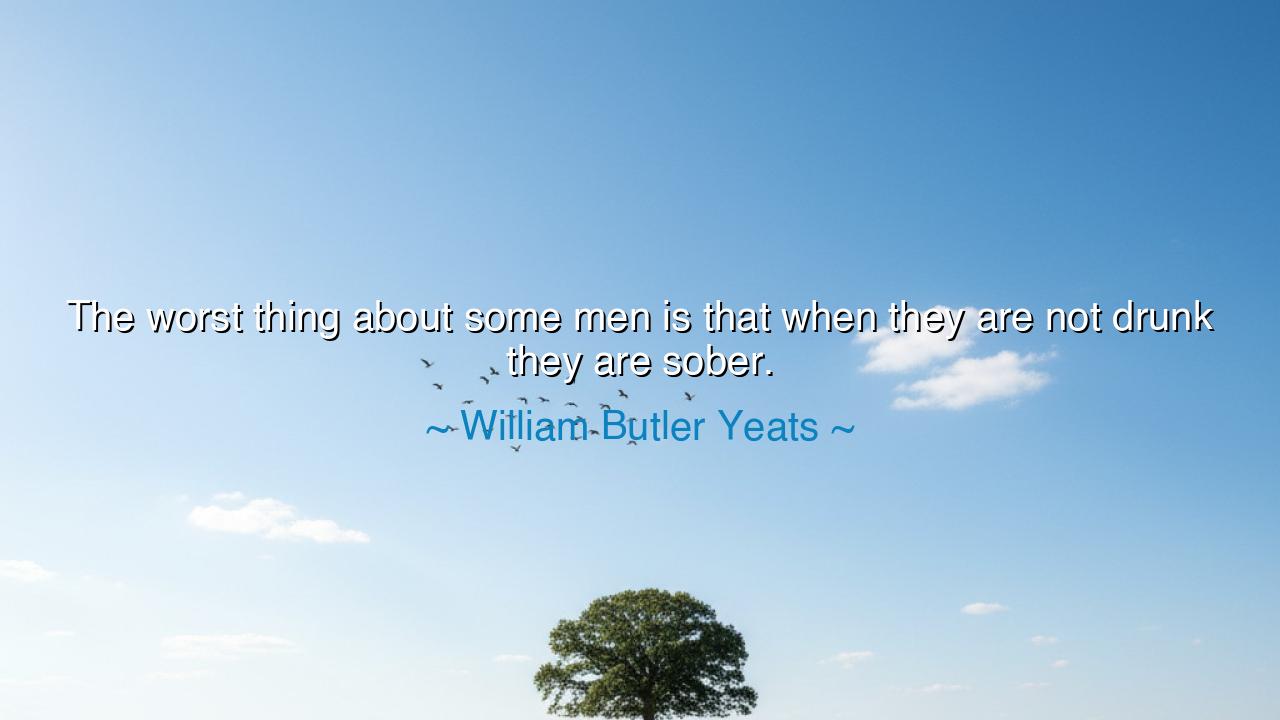
The worst thing about some men is that when they are not drunk






Listen, O children of wisdom, for the words of William Butler Yeats are like a mirror reflecting the darkness that sometimes dwells within the human spirit. He speaks thus: "The worst thing about some men is that when they are not drunk they are sober." These words, though laced with irony, carry a profound truth about the nature of human character, about the struggle between the vices and virtues that reside within us. It is a statement that challenges us to consider the true essence of a man, not in his moments of indulgence, but in the clarity that comes when the fog of intoxication has lifted.
What does it mean, O wise ones, to be sober? Is it simply the absence of alcohol or drugs, or is it the clarity of mind that allows a man to see the world as it truly is? Yeats speaks of a kind of sobriety that is far more perilous than the state of drunkenness. For in the absence of intoxication, some men reveal the fullness of their flaws, their greed, their pettiness, and their shallow desires. When they are sober, they stand exposed, without the veil of escapism that drink may provide. It is in this state of full awareness, O children, that the ugliness of the human condition can be most starkly seen. The man who is sober but lacks virtue is not merely lacking in intoxication—he is a vessel of emptiness, a creature defined by his weaknesses.
Consider the great rulers of history, O seekers of truth, those who were said to wield power but whose true character was revealed not in the height of their influence, but in the stillness of their sober moments. Alexander the Great, though a conqueror of worlds, was known for his wrath and impulsiveness. In his moments of sobriety, his true nature—a man prone to rage and self-destructive tendencies—was often revealed. His exploits, driven by the need for glory, were marred by the same arrogance and impatience that followed him in his moments of clarity. Yeats’ words remind us that some men, when faced with the fullness of awareness, reveal their inability to temper their desires, their egos, and their lust for power.
And yet, there is wisdom to be found in this revelation, for it teaches us that the true character of a man is not to be found in his most exalted moments or in the times of his greatest achievements, but in the quiet of his soul, in the clarity that comes when he is free from the distractions of intoxication—whether of the body, the mind, or the spirit. The man who seeks refuge in drink or in distraction is hiding from the truth of his own character. But when he is sober, when he stands in full awareness, it is then that he faces the truth about himself.
Think of the philosophers of old, those who did not seek solace in the pleasures of the body but sought truth in the clarity of the mind. Socrates, in his wisdom, understood that it was in the sober contemplation of life’s greatest questions that the soul could be truly tested. He did not hide behind the veil of pleasure, but instead, he sought to know himself and to challenge the world around him. Yeats' words, while mocking in tone, challenge us to look deeply into our own lives and ask ourselves: when the distractions of the world are gone, when we stand in sobriety, what do we see in the mirror? Is it a reflection of virtue, of strength, and of truth? Or is it a shadow of the darker desires we have kept hidden?
And so, O children, let us take this lesson to heart. Sobriety is not simply the absence of intoxication; it is the presence of awareness, discipline, and self-control. When we stand in the light of clarity, we must ask ourselves what is revealed about our character. Are we governed by our baser instincts, by our ego, by our desires for power, wealth, or comfort? Or do we stand with humility, with strength, and with the resolve to act in accordance with virtue? The journey of life, O children, is not about hiding behind distractions, but about confronting the truth of who we are and seeking to grow into the best version of ourselves.
Remember the words of Yeats as you move through life: look to the sober moments and ask yourself, "What am I becoming when there is no escape?" In those quiet moments, may you find the strength to rise above the shortcomings that seek to define you and the courage to shape yourself into a person who is not just sober in body, but in mind and spirit. True greatness is not found in the intoxication of fleeting pleasures, but in the clarity and truth that comes from standing in full awareness of yourself, your choices, and your potential. May you strive, O children, to be sober, to be true, and to face the world with the power of integrity.






AAdministratorAdministrator
Welcome, honored guests. Please leave a comment, we will respond soon